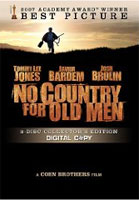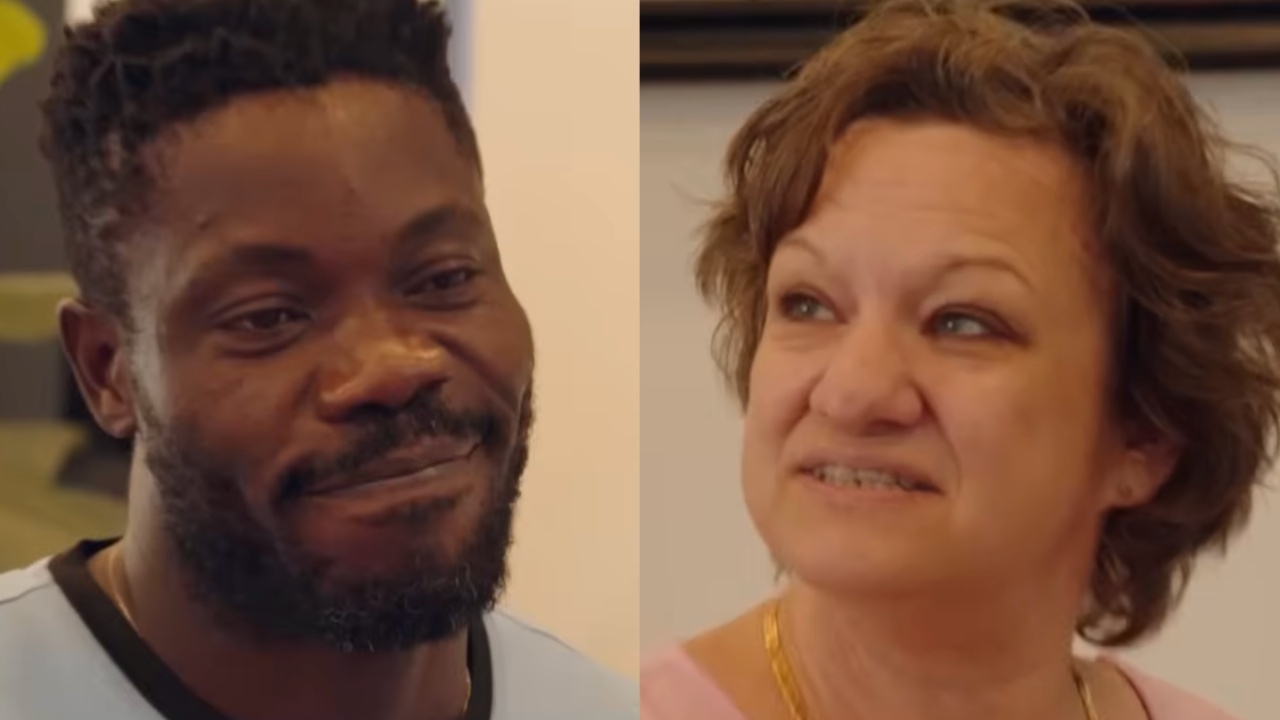What starts off as the best Charles Bronson movie not to star Charles Bronson ends up as a literary adaptation of a novel by Cormac McCarthy that thinks it means something or other. Like many Bronson films, No Country For Old Men is the story of a not-so-good man who is pursued by an extremely bad one when he comes in possession of a suitcase full of drug money. The difference here is that Lleweyln Moss (Josh Brolin) is not quite as cunning as Bronson and the bad man doing the pursuing, Anton Chigurh (Javier Bardem) is almost supernatural in his powers and all encompassing evil. He's like the Terminator only not from some distant future but from the fiery pit of hell itself.
The Coens surprisingly channeled the spirit of John Huston and produced quite a faithful, workmanlike adaptation of the source. This means that for the first two thirds of the film we get some undiluted badass crime fiction that can stand toe to toe with the work of pulp novelist Jim Thompson. Like Thompson, McCarthy is fascinated by the evil that men do and like Thompson's novel "The Getaway", McCarthy attempts to open up his crime story into a larger framework in the final third; abandoning the story's traditional set up for something a bit more surreal. In Thompson's case, the lovers-on-the-run plot is sent straight to a literal hell called EL REY where husband and wife discover that no one "gets away" with it in the end. In No Country for Old Men, it's the audience that is sent to movie hell when they find out that the narrative they've invested their precious time and emotions into has quite simply been abandoned and replaced by a thematic one about hope in a world of chaos and random evil.
It's telling that in Sam Peckinpah's 1972 film of The Getaway, the entire El Rey ending is junked and replaced by a scene where Peckinpah has Steve McQueen blowing away scores of bad guys in the director's trademarked slow motion. I'm sure that the self-destructive side of Peckinpah relished the idea of sending McQueen and co-star Ali MacGraw to a sweltering Mexican hell. He basically did that to Warren Oates in his later film, Bring Me The Head of Alfredo Garcia. But the truth is that the film version of The Getaway is best served by the cool shootout since it satisfies the needs of the genre without pretension.
The Coens bring their usual visual and aural precision to the film with many scenes exploiting their skill at wringing deadpan humor out of watching paint dry. Even a brief shot of a crumpled candy wrapper slowly unraveling like a flower in bloom is made comically sinister by the crackling sound it makes. Technically, very little of the film can be faulted. The cinematography by Coens regular Roger Deakins is as good as they come. Vibrant amber tones during the day give way to a doom laden blackness at night and in between is some of the greatest "magic hour" dawn/dusk shots since Days of Heaven. The performances are all top notch with Bardem's tonsorially-challenged assassin entering into pop culture history as a truly memorable screen weirdo.
It's the content that all this technical skill is lathered upon that is flawed but McCarthy's novel is not the problem. His Psycho-styled narrative sleight of hand works well enough on the page where a story plays out in a more internal, cerebral way. But in a movie, everything is a little too-literal-and the loss of Moss as our identification figure doesn't force us to deal with the story in a more contemplative way but instead makes us wonder why we came to the show at all. Had the film allowed for a more philosophical reading earlier on this shock effect would've worked much better. Simply allowing more screen time for Ed Tom Bell (Tommy Lee Jones) to muse about the world or to even narrate the entire story in third person would've kept us on our toes in the Brechtian manner McCarthy clearly intends. Bell is not the protagonist but he is the witness to the horrors of the world in No Country for Old Men, an old man himself who finds that he's no longer a match for a world gone "blood simple". No Country For Old Men was released last year in a single disc edition in standard-def and Blu-Ray and included a tiny morsel of bonus features which was a full course meal compared to the usual Coen offerings. But in a justification for double dipping, this 3 Disc Collector's Edition contains what seems like 7,000 hours of extras across two discs. None of them, however, include my own ending for the film in which Moss faces off against Chigurh and shoots him in the head with his own cattle gun. But that's OK. Lots of folks seem to like the movie just fine as it is.
Disc One contains the main feature presented in 2.35:1 aspect ratio enhanced for 16:9 displays. It's really the exact same disc as the original release. It has the same set of extras including "The Making of No Country For Old Men" which is a general behind the scene featurette that is more interesting played with the audio muted since the footage of Deakins and the Coens working on the set is worth more than the standard talking heads stuff about how cool it is to work with one Coen let alone two.
Which is exactly what "Working with the Coens" is about. Nothing special but pretty informative for those who know very little about their working methods. The final featurette on disc one is "Diary of a Country Sheriff" which focuses on the character of Ed Tom Bell and his place in the story. Tommy Lee Jones is very articulate about his role and why he felt intrigued at playing yet another lawman.
Your Daily Blend of Entertainment News
Disc Two is the new stuff and the main treasure trove. This is a time capsule of interviews, featurettes and marketing pieces. The main featurette is Josh Brolin's own "Josh Brolin's Unauthorized Behind-the-Scenes Featurette" . It's actually a very funny short film on its own and is not really meant to be an authentic look behind the scenes. Most of it is an affectionate joke at the Coens' expense as the cast take pot shots at their lack of direction. Javier Bardem is particularly amusing and there's a great gag when Bardem refuses to talk on record about his problems with the Coens and then we get a silhouetted image of an obvious Bardem talking with his voice disguised electronically. Very enjoyable.
The rest of the disc is a collection of interviews organized chronologically from 10/26/07 to 2/9/08. There is a lot of overlap on these interviews as journalists ask the same questions over and over. Which is why it's not hard to understand why the Coens and cast seem to have a certain deer in the headlights look by the end.
Of the bunch, EW.Com's "Just a Minute" interview with Bardem is very good. A stronger set of questions from the interviewer and Bardem's own frankness give this some real content beyond the chat show aesthetic. Bardem gives some real insight as to how he came off so sinister in the movie by discussing the fact that it's not enough to play "scary" but that characters around him had to be convincingly afraid of him to give him the stature. It's a lesson more actors and filmmakers should take note of when trying to create threatening characters onscreen.
The "Creative Writing Podcast" is, like several of these extras, an audio only extra. It's a podcast in which the Coens let down their guard a bit and snicker about all the tricks screenwriters like to talk about like writing in three acts, outlining and and character "development". The Coens do none of that, simply starting from scene one and going forward until they hit a wall. They figure that if they don't know what's going to happen next then the audience won't either. As for working on an adaptation, they claim that it wasn't too different from their usual process although the main difficulty was to get Ed Tom Bell's interior monologues into dramatic dialogue for certain scenes.
The "In-Store Appearence" gives Josh Brolin a chance to talk about his very unique audition tape lit and photographed by Robert Rodriguez and directed by Quentin Tarantino. The Coens ignored him initially while praising the lighting. That tape would've made a great extra for this disc but it's unfortunately not here.
A round table interview with Charlie Rose is fine as always and a Q and A session moderated by Spike Jonze is also fairly informative. There are many more sit down interviews with cast and crew and 6 more audio interviews included as well. But a lot of the ground is covered over and over again.
That covers two discs of a three disc collector's edition. So, what about the third disc? Well, it seems that Buena Vista Home Entertainment thinks "collector" and believes that they would want to protect their original DVD at home. So what if you want to watch this film while on a business trip or just down at the coffee shop? That's where Disc Three comes into play. It's a Digital Copy of the movie you can take on the road without fear. Not really necessary if you ask me, but then again I've never thought of myself as much of a "collector".

